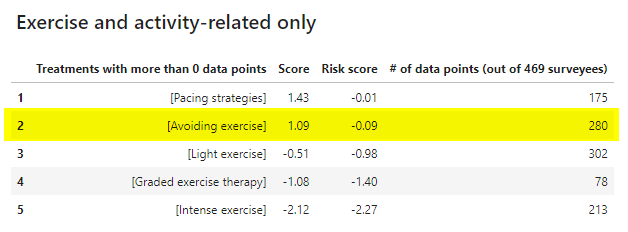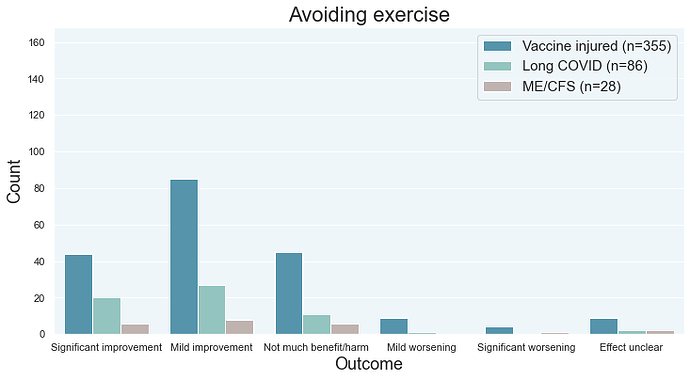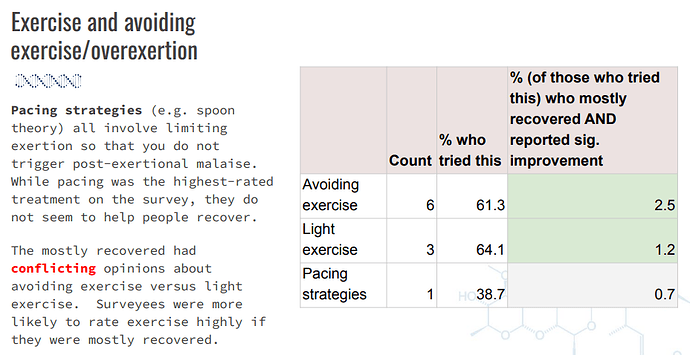Some people out there have been worn out by the treatment treadmill and don’t want to take the risk of trying more treatments. So, I’m going to highlight some potential treatments with low levels of risk. The first one is avoiding exercise.
What you need to know:
-
 The evidence for this is shaky. Avoiding exercise may not do anything.
The evidence for this is shaky. Avoiding exercise may not do anything. -
 A few people report worsening from avoiding exercise. If these people are right (who knows), then there is a small amount of risk to doing this.
A few people report worsening from avoiding exercise. If these people are right (who knows), then there is a small amount of risk to doing this. -
 (Slightly) lower risk than ivermectin and black seed oil, which are the lowest-risk treatments among the 6 most proven treatments.
(Slightly) lower risk than ivermectin and black seed oil, which are the lowest-risk treatments among the 6 most proven treatments. -
 The chance of this particular treatment working is really low (possibly even 0%). It may be a long shot.
The chance of this particular treatment working is really low (possibly even 0%). It may be a long shot.
Survey data + what it’s actually measuring?
The table below shows how ‘avoiding exercise’ compared to other exercise-related treatments:

If you take the data at face value, then there seems to be a ‘Goldilocks effect’. Too much exercise is bad, but also too little exercise is bad.
However, what is the survey really measuring? Some of the data doesn’t entirely make sense. If you compare ‘pacing strategies’ to ‘avoiding exercise’, pacing strategies seem to be safer AND more effective. However, we would get different results if we look at the data another way… Only 1 person who recovered rated ‘pacing strategies’ highly. For ‘avoiding exercise’, 6 people who recovered rated it highly (see slide 23). So, avoiding exercise seems to be more effective at helping people recover. It should be rated higher than pacing strategies but isn’t.
So here’s one possibility: some people think that pacing strategies are helping them when that’s not actually the case. It’s difficult to build evidence for or against this without more reliable data (e.g. a cross-over trial comparing pacing strategies to avoiding exercise). However, the important point is this: survey data can be unreliable. It doesn’t always measure treatment outcomes even though that is the data that we’d really like to collect. Sometimes it is measuring other things such as how a small minority answers surveys differently than everybody else (I am one of those people).
Alternative scenarios are also possible. Maybe ALL of the patients right. Maybe some people are getting hurt by ‘avoiding exercise’ while a few lucky patients are recovering because of it. I just don’t have reliable data to tell you the truth.
What is “avoiding exercise” anyways?
It is likely people have different ideas about:
- Aggressive resting, where you intentionally try to lie in bed or to sleep. People may have different ideas as to whether or not ‘aggressive resting’ is the same thing as ‘avoiding exercise’.
- What should avoiding exercise be compared to?. Should it be compared to very intense exercise (e.g. the kind that makes you sweat) or should it be compared to very low levels of exercise? If all surveyees compared it to intense exercise, then the average score would likely be higher. So, how people interpret the question makes a big difference on the data.
Aggressive resting may be buried in the data
Let’s suppose that all 6 of the people who recovered were doing aggressive resting, and that only 100 people tried it. That would mean that the ‘response rate’ is 6% rather than 2.5%. Using these made-up number, that would put aggressive resting among the top treatments. It’s possible that the survey data is hiding how good aggressive resting is.
I really have no idea if this is going on. I don’t have surveyees’ contact information so I can’t ask if they did a specific form of avoiding exercise.
‘Response rate’ data
At least 2.5% responded to avoiding exercise, according to the survey answers. Other people may have also responded to it but not to the point where they are mostly recovered.
Some information on aggressive resting
MEPedia has a stub page on “aggressive rest therapy”.
https://me-pedia.org/wiki/Aggressive_rest_therapy
Hot take
My theory is that avoiding exercise is very safe but also very ineffective. But, the survey data does not support my hot take.
The bottom line
At the core of this, there is something helpful. The biggest takeaway from survey data is that exercise hurts most people. And so it’s not surprising that 6 people who recovered rated ‘avoiding exercise’ highly.
Beyond that… we get into speculative territory. However, this kind of experimental treatment is on the low risk side of things.


